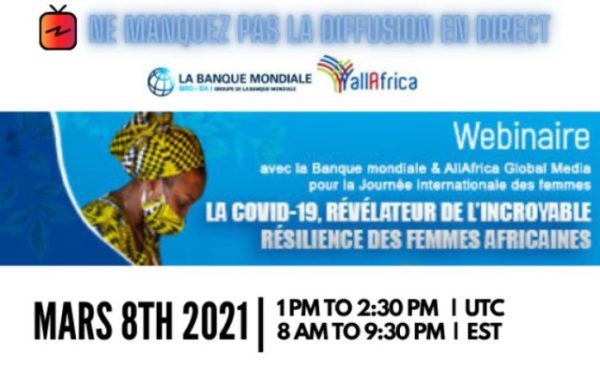In this time of pandemic, the women of sub-Saharan Africa have shown extraordinary resilience more than ever. In the face of adversity, the strength and intelligence of African women have enabled the continent to hold out, proving once again that investing in them is essential, that women’s economic empowerment is the key to prosperity for all.
This question will be at the heart of the webinar that the World Bank and AllAfrica Global Media, world leader in the distribution of information from Africa, are co-organizing on Monday, March 8, 2021 on the theme: “COVID-19, Revealer of the Incredible Resilience of African Women ”which you can follow (1 p.m. to 2:30 p.m. GMT / 8 a.m. to 9:30 a.m. ET) from the following links:
https://fb.me/e/45MSUDqIy
https://fr.allafrica.com/specials/AllAfrica_Womens_Agenda/
https://www.banquemondiale.org/fr/events/2021/03/08/la-covid-19-revelateur-de-lincroyable-resilience-des-femmes-africaines
Tweets by AllAfricafrench
. The discussion will bring together Mr. Ousmane Diagana, Vice-President of the World Bank for West and Central Africa; Dr Aissatou Sophie Gladima, Minister of Petroleum and Energy of Senegal; Hindou Oumarou Ibrahim, Chadian environmental activist and geographer; Djaïli Amadou Amal, Cameroonian writer committed to social discrimination and the condition of women in the Sahel and Rabiatou Harouna Moussa computer engineer and co-founder of WO’MEN Dev. With an exclusive intervention by African music icon and UNICEF ambassador, Ms. Angélique Kidjo.
In its 2021 report Women, Business and the Law, the World Bank welcomes progress in legal reforms aimed at improving women’s economic opportunities and their employment prospects. Sub-Saharan African countries have thus initiated reforms related to the world of work: “43 of the 48 countries in the region (90%) prohibit any discrimination between men and women at work” but also the raising of the minimum age. marriage.
The community-based and inclusive approach is also proving to be the key to success on issues of women’s economic empowerment: the Regional Project to Support Pastoralism in the Sahel (Praps) has offered more than 517 qualifying training courses in rural areas. It is the populations themselves who co-constructed this project financed by the World Bank and deployed in six countries of the Sahel including Burkina Faso, Mali, Mauritania, Niger, Senegal and Chad. It has enabled more than 20,000 people, 88% of whom are women in the beneficiary countries, to successfully engage in income-generating activities. The women of the village of Bouteydouma (Mauritania) who are starting a second youth thanks to the support of the Regional Project of Support to Pastoralism in the Sahel testify that their husbands have been by their side “since they saw the money coming into the home”. Community support involves buy-in from all of society and families to support their emancipation.
Through the various national development strategies drawn up in this context of economic recovery, the authorities are considering reducing the double day for women by relieving them of daily household chores. The mobile crèches project in Burkina Faso supported by the World Bank has met with great success with hundreds of women who have called on this service in order to be able to go to work in peace. A simple and inexpensive initiative that countries like Cameroon, Madagascar, Ethiopia and the Democratic Republic of the Congo will replicate.
The World Bank welcomes the action of several leading African governments in promoting women’s rights and their economic empowerment through reforms undertaken with the help of technical and financial partners and civil society actors. The African woman is a driving force for emergence. You just need to give her the tools and the space for her to fully express the ingenuity, creativity, dynamism and entrepreneurial spirit that are within her. Numerous studies show that investments in education, health and economic opportunities for women and girls are essential to accelerate the demographic transition in sub-Saharan Africa and drive sustainable economic growth.



